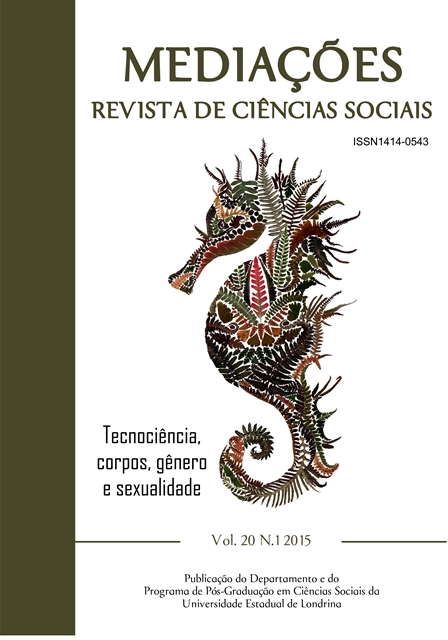Understanding the risks, managing life: genetic counselling between biopolitcs and society of control
DOI:
https://doi.org/10.5433/2176-6665.2015v20n1p151Keywords:
Genetic counselling, Eugenics, Biopower, Society of controlAbstract
The aim of this paper is to compare the genetic counselling (GC) with the eugenic policies of the early twentieth century. We perform an analysis of how GC is portrayed by the Brazilian press as well as a theoretical discussion about the configurations of biopower in a biotechnological context. Our results indicate that while eugenics was practiced by States that disciplined individual conduct and regulated its populations to "improve the human race", the GC relates to the neoliberal governmentality's and to the society of control rationalities. It happens because the GC takes place in a context in which government, market and experts modulate the probabilities and risks associated to individuals who, as "entrepreneurs of themselves", need to manage their genetic capital and are considered as customers and stakeholders, and not only patients and citizens.Downloads
References
BRUNONI, Décio. Aconselhamento Genético. Ciência e saúde coletiva, São Paulo, v. 7, n. 1, p. 101-107, 2002.
CASTELFRANCHI, Yurij. Scientists to the streets. Science, politics and the public moving towards new osmoses. JCOM - Journal of Science Communication, Trieste, v. 1, n. 2, p. 1-14, jun. 2002.
CASTELFRANCHI, Yurij. As serpentes e o bastão: tecnociência, neoliberalismo inexorabilidade. 2008. Tese (Doutorado em Sociologia) - Universidade Estadual de Campinas, Campinas, 2008.
DELEUZE, Gilles. Post-scriptum sobre as sociedades de controle. In: DELEUZE, Gilles. Conversações: 1972-1990. Rio de Janeiro: Ed. 34, 2010.
DINIZ, Débora. Autonomia reprodutiva: um estudo de caso sobre a surdez. Cad. Saúde Pública, Rio de Janeiro, v. 19, n. 1, p. 175-181, jan.- fev. 2003.
FOUCAULT, Michel. About the Beginning of the Hermeneutics of the Self: Two Lectures at Dartmouth. Political Theory, v. 21, n. 2, p. 198-227, may. 1993.
FOUCAULT, Michel. A governamentalidade. In: FOUCAULT, Michel. Microfísica do poder. Rio de Janeiro: Graal, 2006.
FOUCAULT, Michel. Nascimento da biopolítica: curso dado no Collège de France (1978-1979). São Paulo: Martins Fontes, 2008a.
FOUCAULT, Michel. Segurança, território, população: curso dado no Collège de France (1977-1978). São Paulo: Martins Fontes, 2008b.
HARAWAY, Donna. A Cyborg Manifesto: Science, Technology, and Socialist Feminism in the Late Twentieth Century. In: HARAWAY, Donna. Simians, Cyborgs and Women: The Reinvention of Nature. New York: Routledge, 1991.
LEWIS, R. Barry; MAAS, Steven. QDA Miner 2.0: Mixed-Model Qualitative Data Analysis Software. Field Methods, v. 19, n. 1, p. 87-108, feb. 2007.
LOPEZ-RUIZ, Osvaldo. A técnica como capital e o capital humano genético. Novos estudos - CEBRAP, n. 80, p. 127-139, mar. 2008.
MONTEIRO, Marko. Os dilemas do humano: reinventando o corpo numa era (bio)tecnológica. São Paulo: Annablume, FAPESP, 2012.
NOVAS, Carlos; ROSE, Nikolas. Genetic risk and the birth of the somatic individual. Economy and Society, v. 29, n. 4, p. 485-513, nov. 2000.
NOWOTNY, Helga; SCOTT, Peter; GIBBONS, Michael. Rethinking science: knowledge and the public in an age of uncertainty. Cambridge: Polity Press, 2001.
PEPPERELL, Robert. The Posthuman Condition: consciousness beyond the brain. Bristol: Intellect, 2003.
PINA-NETO, João Monteiro. Aconselhamento genético. Jornal de Pediatria (Rio J.), Porto Alegre, v. 84, n. 4, p. 20-26, ago. 2008.
ROSE, Nikolas. Politics of life itself: biomedicine, power, and subjectivity in the twenty-first century. Princeton: Princeton University Press, 2007.
SOUZA, Vanderlei. Em nome da raça: a propaganda eugênica e as idéias de Renato Kehl nos anos 1910 e 1920. Revista de História Regional, Ponta Grossa, v. 11, n. 2, p. 29-70, 2007.
Downloads
Published
How to Cite
Issue
Section
License
Copyright (c) 2015 Bruno Lucas Saliba de Paula, Yurij Castelfranchi

This work is licensed under a Creative Commons Attribution 4.0 International License.
Copyright on articles published in Mediações belongs to the author(s): in the case of partial or entire republication of the original publication, we ask author(s) to indicate the original publication in the periodical.
Mediações uses the Creative Commons Attribution 4.0 International license, which allows Open Access, enabling any user to read, download, copy and disseminate its content so long as adequately referenced.
The opinions expressed by the author(s) are their sole responsibility.
































